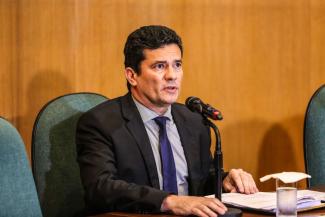Bolsonaro cabinet
Controversial appointment

In early April, Moro’s investigations resulted in the arrest of former president Luiz Inácio Lula da Silva. Charged with failing to declare ownership of an apartment, the elder statesman was sentenced by the Curitiba judge to 12 years in prison for passive corruption and money laundering. His treatment seems utterly disproportionate given that other Brazilian politicians, who have committed far more serious offences, have not been indicted and so far escaped even the merest stain on their careers.
Although all the polls showed him to be the strongest candidate, Lula was banned from running in the presidential elections in October 2018 because he was in prison. Moro’s ruling thus helped Bolsonaro to win – at least indirectly. In the eyes of the people who blame Lula’s Workers’ Party for all the country’s ills since protests erupted in 2013, Moro became a kind of superhero, symbolising the fight against corruption.
Indeed, the conduct of “Superminister” Moro has so far been full of contradictions. Some of his actions as a judge have not been honourable and impartial. Serving as a judge in Curitiba, he repeatedly stated that he had no intention of going into politics. Now he is joining a new government after having jailed its most influential opponent. That decision casts doubt on the legitimacy of the Operation Car Wash (Lava Jato), the large-scale anti-corruption investigation that, apart from Lula’s arrest, has had many legal implications.
One of the responsibilities of the National Council of Justice (CNJ) is to ensure the independence of the justice system. It also conducts disciplinary proceedings against members of the judiciary. In early November, it asked Moro to explain his alleged party-political activities while still serving as a judge. He denied any wrongdoing and any connection between his ministerial appointment and Lula’s prosecution.
Moro claimed it had “surprised” him that he was invited to become justice minister. Today, however, it is known that Moro was contacted by Paulo Guedes, the incoming finance minister, during Bolsonaro’s election campaign.
Lingering suspicions
The suspicions that Moro may be guilty of political interference is fuelled by other facts too. During the Lava Jato investigation, he revealed that former president Lula da Silva’s phone calls had been intercepted, including one with Dilma Rousseff, his successor as head of state. The fact that Lula’s phone was tapped was not entirely surprising, but the timing of the revelations was significant. They came shortly before Lula was going to become a minister in Rousseff’s cabinet. Moro’s intervention prevented that.
Moro later apologised to the Supreme Federal Court for the “controversy” thus caused. He gave assurances that the breach of confidentiality about wiretapping had not been driven by any desire to generate “party-political polemic or conflict”.
During a conference at Harvard University in 2017, Moro described election slush funds as fraud and “a crime against democracy”. However, Onyx Lorenzoni, the new president’s chief of staff, has admitted the use of slush money for campaign purposes. Initial investigations have been launched against him. Asked how he could join an administration tainted this way, Moro replied: “He has admitted it and apologised”. In Lorenzoni’s case, the judge evidently felt that an apology sufficed for an acquittal from a criminal charge.
To push through his right-wing agenda, Bolsonaro will have to forge majorities in Brazil’s fragmented congress. He will also need the support of the Supreme Federal Court. It is quite possible that he will appoint Moro to the highest judicial level in 2020 or 2021. That is when two top-tier justices are due to retire. Asked about this prospect, Moro spoke of “a future possibility”. Experts believe Moro’s immediate appointment as a Supreme Federal Court justice would cause disquiet in Brasília. So far, he was a lower-level judge and has not handled any appellate cases. The newspaper Folha de São Paulo quotes one district court judge as likening his possible promotion to “appointing a soldier from the ranks to command generals”.
It is also possible, however, that the former federal judge has other ambitions. Despite denying any such intention, he may be considering to run for president in 2022 in the hope of becoming Bolsonaro’s successor. He says he sees his present role in the administration as a technical rather than political appointment. But given his history, the more liberal sections of the population no longer trust him.
Security experts say that the team Moro has put together, is experienced in fighting corruption and organised crime, but has little expertise in other important areas such as combatting robbery and murder. Moro can no longer pin the blame on the Workers’ Party; his own actions are the ones that will now be judged.
Carlos Albuquerque works for the Brazilian programme of Deutsche Welle in Bonn. This contribution was finalised in mid-December, before Bolsonaro took office on 1 January 2019.
carlos.albuquerque@gmx.de







